Read more
Zusatztext brilliant . . . Anyone interested in learning about early modern Indian philosophy will have the best work I know of on the subject in their hands. And those interested more in the philosophical issues than in comparing traditions will also profit greatly. . . Ganeri's book is a fascinating view of Indian philosophy and how its insights have genuine relevance for contemporary debates. I could not recommend it more highly. Informationen zum Autor Jonardon Ganeri is a philosopher who draws upon Indian, European and Ango-American sources in his work. He is currently Professor of Philosophy at the University of Sussex. He read Mathematics at Cambridge before commencing graduate studies in Philosophy at London and Oxford. He has been a Jacobsen Fellow in Philosophy at King's College London and a Spalding Fellow at Clare Hall Cambridge. As well as teaching at various Universities in Britain, he has held visiting professorships at the University of Chicago and the University of Pennsylvania. Klappentext Jonardon Ganeri tells the story of a fascinating period in intellectual history, when Indian philosophy moved into the modern era. Philosophers no longer defer to ancient authorities, but draw upon their insights to seek a true understanding of knowledge, self, and reality. This missing chapter in the development of modernity can at last be read. Zusammenfassung Jonardon Ganeri tells the story of a fascinating period in intellectual history, when Indian philosophy moved into the modern era. Philosophers no longer defer to ancient authorities, but draw upon their insights to seek a true understanding of knowledge, self, and reality. This missing chapter in the development of modernity can at last be read. Inhaltsverzeichnis Introduction PART I: INDIA EXPANDING 1: The World and India: 1656 2: Dãrã Shukoh: A Spacious Islam 3: The Cosmopolitan Vision of Yasovijaya Gani 4: Navadvïpa: A Place of Hindu-Muslim Confluence in Bengal PART II: TEXT AND METHOD 5: Contextualism in The Study of Indian Philosophical Literature 6: Philosophy outside Academies: Networks 7: An Analysis of the New Reason's Literary Artefacts 8: Commentary and Creativity PART III: THE POSSIBILITY OF INQUIRY 9: Inquiry: The History of a Crisis 10: Challenge From The Ritualists 11: Interventions in a New Research Programme PART IV : THE REAL WORLD 12: Realism in Question 13: New Foundations in the Metaphysics of Mathematics 14: Metaphysics in a Different Key PART V: A NEW LANGUAGE FOR PHILOSOPHY 15: The Technical Language Assessed 16: Rival Logics of Domain Restriction Conclusion Bibliography ...

